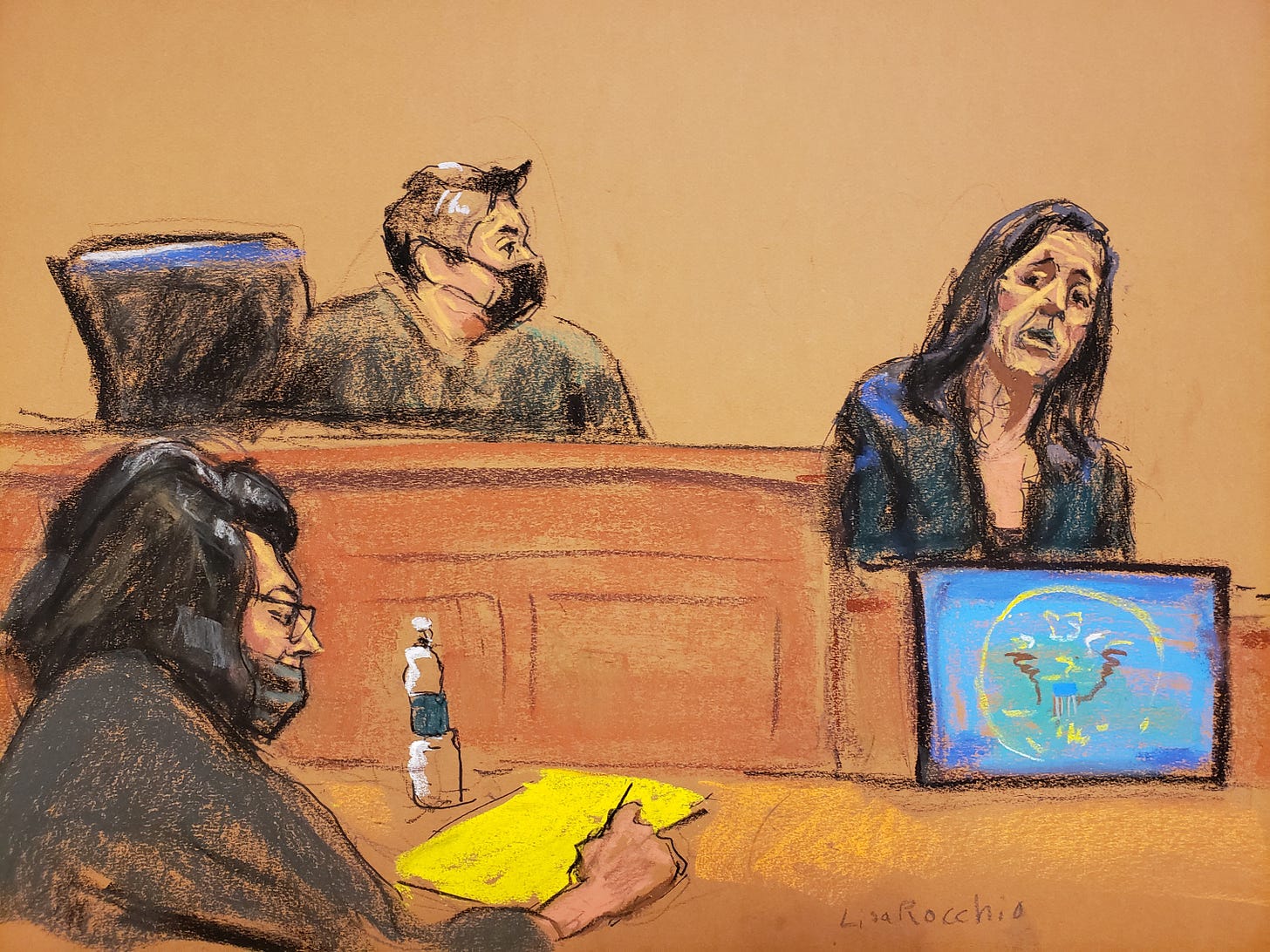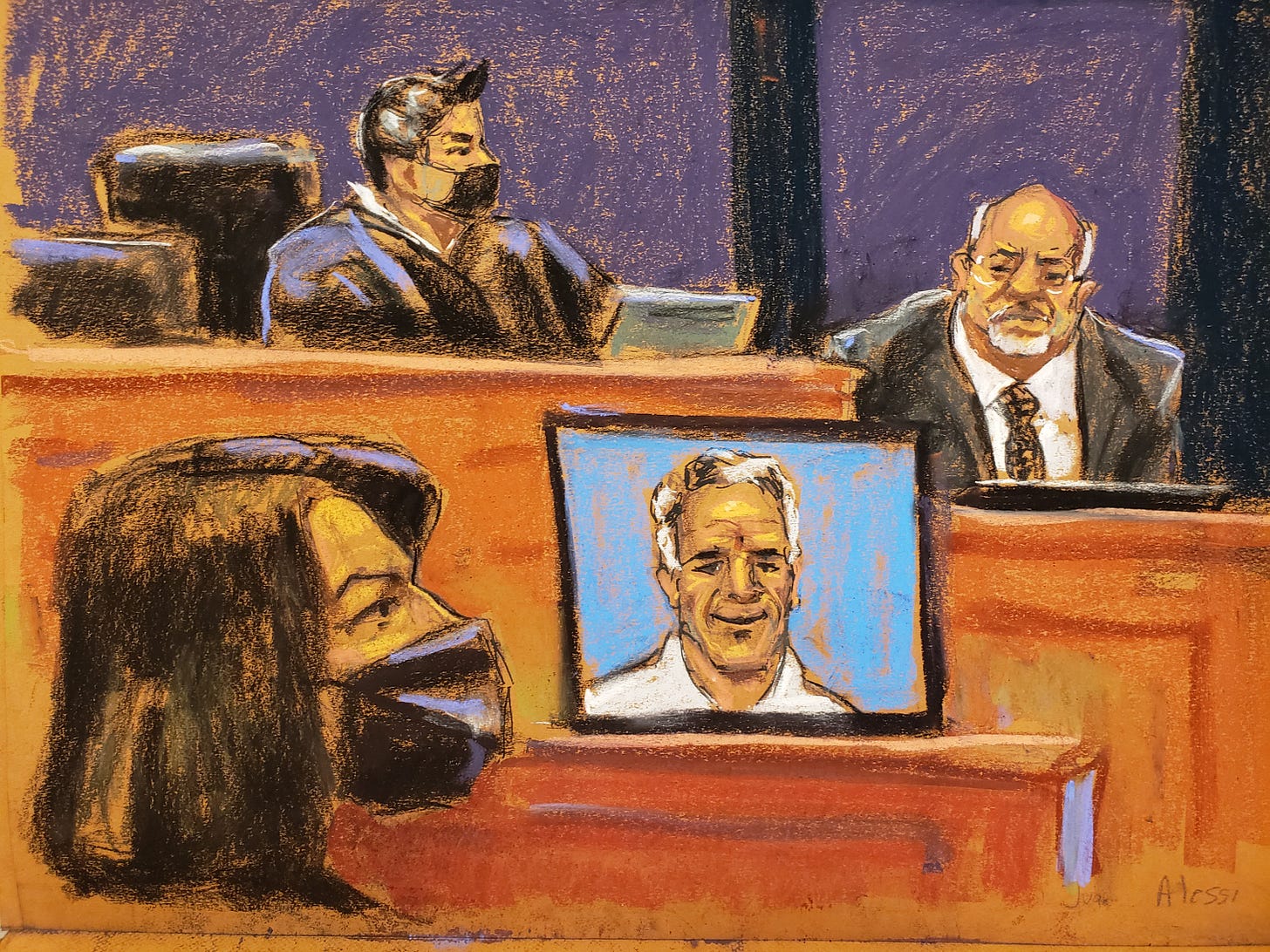On day four of the Maxwell trial, finally the government started to call witnesses who are helpful to them.
Yesterday morning saw Dr. Lisa Rocchio, a clinical and forensic psychologist, give her expert opinion on how “grooming” minors for sexual abuse works. She explained how predators follow a pre-meditated pattern: first selecting a vulnerable child, then obtaining access to and isolating them, then engaging in lies and manipulation to build “a relationship of trust and attachment,” then de-sensitizing them to sexual content and sexual touch, and then maintaining control “in order to coerce the child into continued sexual abuse and to reduce the likelihood of disclosure.” It was chilling stuff—and it seems from everything we know that this was textbook Epstein behavior.
Still, the question at hand in the trial of Ghislaine Maxwell is not Epstein’s behavior, but rather whether or not Maxwell was an enabler of Epstein’s grooming of minors. And that was not addressed. The only question from prosecutor Laura Pomerantz about grooming by proxy was overruled by Judge Nathan.
This courtroom sketch shows Ghislaine Maxwell (L) taking notes in court during testimony of Lisa Rocchio (R), a forensic psychologist, as Judge Alison Nathan looks on during Maxwell's trial on charges of sex trafficking, in New York City, on December 2, 2021. || JANE ROSENBERG / Getty
As noted previously, memory is a big issue at stake in the Maxwell trial. Dr. Rocchio explained that “delayed disclosure” can impact memory. Survivors sometimes wait years to disclose their abuse, and their recall is diminished as a function of that time.
But defense lawyer Jeffrey Pagliuca did a good job getting Dr. Rocchio to agree that factors other than delayed disclosure can affect memory—including psychological conditions and alcohol. Upon Pagliuca’s questioning, Dr. Rocchio also agreed that, absent a pre-meditated predatorial pattern, the elements that make up “grooming”—such as the giving of gifts and showing interest and attention—are in fact just kindness. Out of context, they are not grooming. She also concurred that most predators are adept at hiding their abuse from others…so you can see where this is headed for the defense, who have maintained they will argue that Maxwell did not know everything Epstein was doing and that he was a brilliant compartmentalizer.
BUT—and it was a big but—then the butler entered.
Longtime Epstein housekeeper Juan Alessi put Maxwell much closer to Epstein’s Palm Beach bedroom—literally—than anyone else in the witness box has so far.
This courtroom sketch shows Juan Alessi (R), Epstein's house manager, Judge Alison Nathan, and Ghislaine Maxwell during her trial on charges of sex trafficking, in New York City, on December 2, 2021. || JANE ROSENBERG / Getty
Alessi’s testimony was most damning for Maxwell in that he clearly said he’d seen two females he thought were under-age: “Jane” and Virginia Roberts (now Giuffre). He said both had frequently visited Maxwell and Epstein in Palm Beach and accompanied them on trips on Epstein’s private plane. He also mentioned the sex toys he’d had to clean up in Epstein’s bathroom after Epstein’s massages.
Alessi also testified that Epstein and Maxwell shared a bedroom 99 percent of the time during his employment and that she was his constant girlfriend, “the lady of the house.” Now that struck me as ironic. As I’ve reported in my discovery+ documentary series “Chasing Ghislaine,” the reality was that, by the late 1990s, Maxwell was not at all sure of her footing with Epstein, according to my sources. She told friends that she worried all the time if he would be headed to Palm Beach without her. She told one person that her weekend plans were always in flux: “I just never know if he’s going to ask me—or somebody else.”
Alessi also testified about the many expectations of his job. He said he worked from 5am to 10pm at night because “it was required by my position” as house manager, and that Maxwell had issued “many, many” rules, including to never look Epstein directly in the eye and not speak to them unless spoken to. He was warned to not discuss his personal life with houseguests. Before they flew anywhere, he had to bathe Max, Maxwell’s Yorkshire terrier, who Alessi said was so terrified of flying that she visibly shook. (Despite that fear of flying, Maxwell took Max with her on all her trips, Alessi said.) As well as shopping, cooking, cleaning, and driving, he was tasked with filling up tissue boxes and replacing stationery (including notebooks that bizarrely were engraved “Lady Ghislaine”). He said that when, around 2000, Maxwell gave him a booklet of “rules” that was at least 30 pages long, he found it “degrading.”
Listening to all this, I was reminded how one of my sources told me that Maxwell’s usefulness to Epstein was that she told him “which salad fork to use.” It seems from Alessi’s testimony that the etiquette lessons were not just for Epstein, but everyone around him.
Unlike Epstein, who grew up in Coney Island, Maxwell had grown up in England the daughter of a global media tycoon, Robert Maxwell, with numerous staff and extraordinary wealth. In order for Epstein to attract the rich, powerful global elite, he knew had to learn how to behave like them, according to my reporting. Maxwell, by contrast, didn’t have to learn. She already knew all this. She’d lived it. Basically, she was bringing Downton Abbey to Palm Beach. Alessi even described how Epstein got less friendly to him once Maxwell was on the scene—the insinuation being she created an Upstairs/Downstairs environment that hadn’t been there previously.
This might all explain why one of the questions for potential jurors in the jury selection was whether they had any particular feelings about “people who are wealthy or have luxurious lifestyles.”
The vivid details of perceived snobbery in Alessi’s testimony will strike many people as both repellant and incredibly odd. Most people don’t live like this, but rich people—particularly rich European people, as Maxwell was—definitely do. Topless sunbathing—which Alessi said he saw a great deal of—would have been perfectly normal to Maxwell.
So, too, would the instruction to Alessi by Maxwell that read, “Remember that you see nothing, hear nothing, say nothing, except to answer a question directed at you. Respect their privacy.”
My gut suggests that Maxwell’s defense will argue today that, in the world she came from, that standard was ordinary.
Of course what’s not normal is underage girls hopping on planes and being jetted all over the place.
All three parts of my docu-series “Chasing Ghislaine” will air back-to-back on ID starting at 8/7c tonight.






